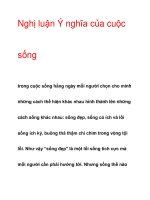Phân biệt nghĩa của từ3 docx
Bạn đang xem bản rút gọn của tài liệu. Xem và tải ngay bản đầy đủ của tài liệu tại đây (61.01 KB, 11 trang )
flounder/founder
FLOUNDER/FOUNDER
As a verb, “founder” means “to fill with water and sink.” It is also used metaphorically of various
kinds of equally catastrophic failures. In contrast, to flounder is to thrash about in the water (like a
flounder), struggling to stay alive. “Flounder” is also often used metaphorically to indicate various
sorts of desperate struggle. If you’re sunk, you’ve foundered. If you’re still struggling, you’re
floundering.
List of errors
file:///C|/Temp/livres/commonerrors/errors/flounder.html03/09/2005 15:38:02
foot/feet
FOOT/FEET
You can use eight-foot boards to side a house, but “foot” is correct only in this sort of adjectival
phrase combined with a number (and usually hyphenated). The boards are eight feet (not foot) long.
It’s always X feet per second and X feet away.
List of errors
file:///C|/Temp/livres/commonerrors/errors/foot.html03/09/2005 15:38:02
footnotes/endnotes
FOOTNOTES/ENDNOTES
About the time that computers began to make the creation and printing of footnotes extremely simple
and cheap, style manuals began to urge a shift away from them to endnotes printed at the ends of
chapters or at the end of a book or paper rather than at the foot of the page. I happen to think this was
a big mistake; but in any case, if you are using endnotes, don’t call them “footnotes.”
List of errors
file:///C|/Temp/livres/commonerrors/errors/footnotes.html03/09/2005 15:38:03
for/fore/four
FOR/FORE/FOUR
The most common member of this trio is the preposition “for,” which is not a problem for most
people. “Fore” always has to do with the front of something (it’s what you shout to warn someone
when you’ve sent a golf ball their way). “Four” is just the number “4.”
List of errors
file:///C|/Temp/livres/commonerrors/errors/for.html03/09/2005 15:38:03
for all intensive purposes
FOR ALL INTENSIVE PURPOSES
FOR ALL INTENTS AND PURPOSES
Another example of the oral transformation of language by people who don’t read much. “For all intents and purposes” is an old cliché which won’t
thrill anyone, but using the mistaken alternative is likely to elicit guffaws.
List of errors
file:///C|/Temp/livres/commonerrors/errors/intensive.html03/09/2005 15:38:03
for free
FOR FREE
Some people object to “for free” because any sentence containing the phrase will read just as well
without the “for,” but it is standard English.
List of errors
file:///C|/Temp/livres/commonerrors/errors/forfree.html03/09/2005 15:38:03
for one
FOR ONE
FOR ONE THING
People often say “for one” when they mean “for one thing”: “I really want to go to the movie. For one, Kevin Spacey is my favorite actor.” (One what?)
The only time you should use “for one” by itself to give an example of something is when you have earlier mentioned a class to which the example
belongs: “There are a lot of reasons I don’t want your old car. For one, there are squirrels living in the upholstery.” (One reason.)
List of errors
file:///C|/Temp/livres/commonerrors/errors/forone.html03/09/2005 15:38:03
for sale/on sale
FOR SALE/ON SALE
If you’re selling something, it’s for sale; but if you lower the price, it goes on sale.
List of errors
file:///C|/Temp/livres/commonerrors/errors/forsale.html03/09/2005 15:38:04
forbidding/foreboding/formidable
FORBIDDING/FOREBODING/
FORMIDABLE
“Foreboding” means “ominous,” as in “The sky was a foreboding shade of gray” (i.e. predictive of a
storm). The prefix “fore-” with an E, often indicates futurity, e. g. “forecast,” “foreshadowing” and
“foreword” (a prefatory bit of writing at the beginning of a book, often misspelled “forword”). A
forbidding person or task is hostile or dangerous: “The trek across the desert to the nearest latte stand
was forbidding.” The two are easily confused because some things, like storms, can be both
foreboding and forbidding.
“Formidable,” which originally meant “fear-inducing” (“Mike Tyson is a formidable opponent”) has
come to be used primarily as a compliment meaning “awe-inducing” (“Gary Kasparov’s formidable
skills as a chess player were of no avail against Deep Blue”).
See also
fearful/fearsome.
List of errors
file:///C|/Temp/livres/commonerrors/errors/forbidding.html03/09/2005 15:38:04
forceful/forcible/forced
FORCEFUL/FORCIBLE/FORCED
These words sometimes overlap, but generally “forceful” means “powerful” (“He imposed his
forceful personality on the lions.” ) while “forcible” must be used instead to describe the use of force
(“The burglar made a forcible entry into the apartment.”). “Forced” is often used for the latter
purpose, but some prefer to reserve this word to describe something that is done or decided upon as a
result of outside causes without necessarily being violent: “a forced landing,” “a forced smile,”
“forced labor.”
List of errors
file:///C|/Temp/livres/commonerrors/errors/forceful.html03/09/2005 15:38:04
forego/forgo
FOREGO/FORGO
The E in “forego” tells you it has to do with going before. It occurs mainly in the expression
“foregone conclusion,” a conclusion arrived at in advance. “Forgo” means to abstain from or do
without. “After finishing his steak, he decided to forgo the blueberry cheesecake.”
List of errors
file:///C|/Temp/livres/commonerrors/errors/forego.html03/09/2005 15:38:04









